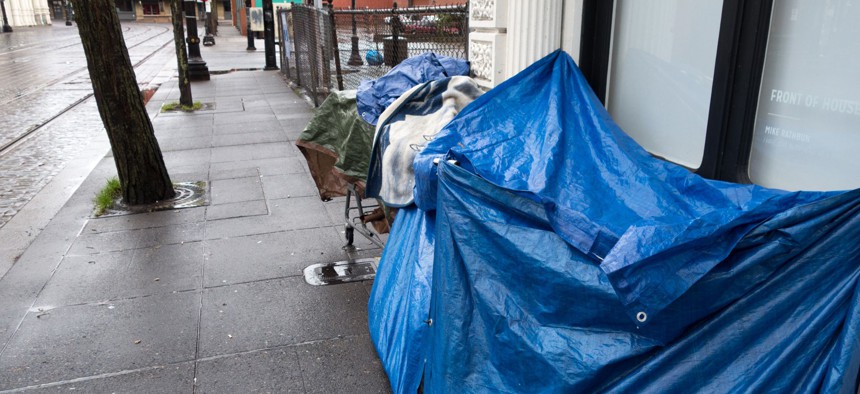A Tough Homelessness Challenge: ‘Compassion Fatigue’ in Municipal Workforces

Portland, Oregon, is no stranger to the challenge of homelessness. Shutterstock

Connecting state and local government leaders
Cities need to support their empathetic frontline city employees who are dealing with a complex problem that “attacks the very core” of what brought them into public service.
PORTLAND, Ore. — While homelessness is a policy issue that knows no jurisdictional boundaries, it’s a social services challenge that’s particularly pronounced in West Coast municipalities and metropolitan areas.
In recent weeks, I’ve listened to panel discussions related to homelessness policy at different gatherings in Santa Monica, California (where a Los Angeles Times summit examined L.A.’s housing challenges among other city-focused issues) and in Seattle (where members of Mayor Ed Murray’s administration, academic and non-profit partners discussed a pilot program to improve performance and data collection in municipal contracting for homeless services and the mayor’s Pathways Home Initiative.)
On Friday in Oregon’s largest city, homelessness and municipal response was the focus of a panel discussion that was part of the annual conference for Engaging Local Government Leaders, featuring Rae Trotta, a Portland-based public health consultant who specializes in community engagement and homelessness, and Jason Dedrick, a policy analyst with Eugene, Oregon’s municipal government. (ELGL hosted six regional pop-up conferences around the nation on Friday, with the Portland gathering the only one to feature a session on homelessness.)
For me, one of the important takeaways from Friday’s ELGL discussion was the impact of “compassion fatigue” in local governments and not just in the broader context of cities providing services for their homeless populations or an empathic general public wanting to assist those sleeping on the streets or in illegal camps.
Many frontline municipal workers, especially those who provide social services, know compassion fatigue all too well.
What exactly is compassion fatigue?
According to a paper titled “Running on Empty” published in Rehab & Community Care Medicine:
It is characterized by deep physical and emotional exhaustion and a pronounced change in the helper’s ability to feel empathy for their patients, their loved ones and their co-workers. It is marked by increased cynicism at work, a loss of enjoyment of our career, and eventually can transform into depression, secondary traumatic stress and stress-related illnesses. The most insidious aspect of compassion fatigue is that it attacks the very core of what brought us into this work: our empathy and compassion for others.
As Dedrick discussed, since there is no one municipal agency with sole responsibility over homelessness in Eugene, the challenge touches so many of his colleagues across the city government, especially parks employees who often have the unpleasant—and sometimes dangerous—task of cleaning up homeless encampments, including dealing with trash, human excrement and hazardous waste.
As many cities have found, dealing with unauthorized camping in public spaces, including parkland, is a “whack-a-mole” type of problem—once one illegal camp is cleared and cleaned up, the problem will simply shift to a new location.
Pouring time, energy and resources into a tough social services challenge like homelessness only to have problems shift location can create workplace stress and sew the seeds of compassion fatigue within a local government that is empathetic and trying to be proactive to provide assistance to homeless populations.
This summer, I pointed out some of Eugene’s homelessness challenges when it comes to resources:
While there are major costs involved with connecting homeless campers with social services, cleaning up illegal campsites isn’t cheap either. Eugene’s city government spends $250,000 annually on camp cleanup activities, including a $66,000 contract with the sheriff’s department—which provides jail labor three days a week to bolster the municipal response—according to The Register Guard. From January through the end of June, 4,500 bags of trash were removed from campsites, along with 2,200 hypodermic needles. (Human waste that can accumulate in homeless camps is harder to quantify.)
Trotta pointed out that unlike larger cities, smaller- and medium-size jurisdictions are sometimes better suited to implement innovative solutions for providing effective homeless services. Still, the challenges are daunting regardless of where you are and how many resources are devoted to homelessness.
And while larger policy prescriptions may revolve around housing and connecting homeless individuals with mental health and other support services, local governments need to be thinking about the complex stresses their frontline employees face with compassion fatigue.
“We need to support [city employees] in the way they need to be supported so they can go out and solve the problem of homelessness,” Dedrick said during the session.
And, unfortunately, that’s easier said than done.
Michael Grass is Executive Editor of Government Executive’s Route Fifty and is based in Seattle.

NEXT STORY: What Skills Will the Next Generation of Government Employees Need?





